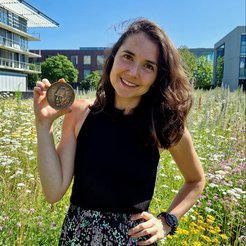Lea Dietrich Awarded Otto Hahn Medal for Junior Scientists
Her dissertation on the structure of mitochondrial proteins has earnt her one of the Max Planck Society’s top distinctions for young researchers.
The Max Planck Society has awarded Dr. Lea Dietrich the prestigious Otto Hahn Medal, recognizing her work on the structure and organization of proteins of the inner mitochondrial membrane. The prize honors outstanding scientific achievements in the context of a doctoral thesis and encourages young talent to pursue a career in research.
Text: Pamela Ornelas
Since 1978, the Otto Hahn Medal has been awarded annually to a select group of scientists across all fields of research within the Max Planck Society. This year, Dr. Lea Dietrich, alumna of the Max Planck Institute of Biophysics, is among the 30 recipients of this competitive honor.
Otto Hahn Medal “for elucidating the arrangement of the mitochondrial GTPase MGM1 and how it remodels mitochondrial cristae and providing new views of the ATP synthase and its rotational states that underlie ATP generation.”

Lea’s doctoral research combined cryo-electron tomography with image analysis to study proteins involved in shaping the architecture of mitochondria. Her thesis focused on a protein called Mgm1, which assembles into long, helical filaments that remodel the inner mitochondrial membrane, an essential process for cellular health and energy production.
Additionally, she expanded our understanding of ATP synthase, the molecular turbine of our cells. By capturing distinct states of this protein motor inside cells, she provided the first in situ glimpse of its catalytic movement, which drives the production of ATP, the cell’s universal energy currency. Her results are not only scientifically impressive but also visually stunning, offering a unique view into the complexity of life on a molecular scale.
Powered by mitochondria
Lea Dietrich’s interest in mitochondrial research is driven by her curiosity to explore and understand how cells convert energy at a molecular level. Her ultimate goal is to study the individual building blocks that together ensure mitochondrial function, and to uncover the mitochondrial mechanisms that remain unknown.
After completing her studies at the Martin Luther University of Halle-Wittenberg, Lea joined the Department of Structural Biology, led by Werner Kühlbrandt at the Max Planck Institute of Biophysics, as a doctoral researcher. She later deepened her work on in-situ mitochondrial structure and ATP synthase through a postdoc in the same group.
Now, Lea Dietrich continues her scientific journey as a Minerva-Fast-Track-Fellow at the Max Planck Institute for Brain Research in the Department of Synaptic Plasticity led by Erin Schuman. She currently investigates the unique functions of neuronal mitochondria, and their implications on mitochondrial structure. She remains driven by curiosity, creativity, and a deep appreciation for the tiny engines that power our cells and thus our brains. She is a well-deserving recipient of the Otto Hahn Medal and a shining example for young women inspired to pursue careers in science.












